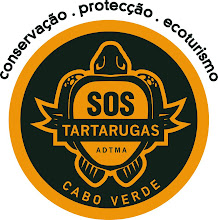 |
| Loggerhead in Sal (photo Filipa Pires) |
Monday, April 30, 2012
The turtles are coming!
Tuesday, April 24, 2012
Shark finning in Mindelo, Cape Verde
A few months ago we wrote about deliberate targetting of turtles by overseas fishing fleets, who blatantly package & label the meat for export to Asian markets.
Now it is very distressing to hear that shark fins are being landed in Mindelo in full view of the authorities.
Francesca Tosarelli is a photographer who witnessed this taking place earlier this year. Ms Tosarelli writes "The European Union has an agreement with Cape Verde to fish highly migratory species, namely tuna. But Spanish and Portuguese vessels actually target sharks because of the high value of their fins on the Asian markets.
Sharks are top predators and removing them has effects on the entire food chain in the area. Smaller fish that would prefer to be in the open ocean stay close to shore to find refuge from the sharks. Those smaller species that have disappeared mysteriously are what locals have caught for centuries. The pressure created by sharks is now so weak that fish which used to shelter by shore now freely roam the open ocean. Local fishermen can’t reach their target species unless they go far out with their little boats (which can have lethal consequences) and shoals are now in reach of international vessels, which can vacuum them up without having to take the risk of fishing them illegally within the 12 mile exclusion zone. "
She also reports that 12,000 tons of shark products were landed in Mindelo in 2011.
For the sake of the environment and the people here who make their living from the sea it is time for the authorities to wake up and stop this illegal pillaging of Cabo Verde's natural resources.
To read more and see more photos click here.
Now it is very distressing to hear that shark fins are being landed in Mindelo in full view of the authorities.
Francesca Tosarelli is a photographer who witnessed this taking place earlier this year. Ms Tosarelli writes "The European Union has an agreement with Cape Verde to fish highly migratory species, namely tuna. But Spanish and Portuguese vessels actually target sharks because of the high value of their fins on the Asian markets.
Sharks are top predators and removing them has effects on the entire food chain in the area. Smaller fish that would prefer to be in the open ocean stay close to shore to find refuge from the sharks. Those smaller species that have disappeared mysteriously are what locals have caught for centuries. The pressure created by sharks is now so weak that fish which used to shelter by shore now freely roam the open ocean. Local fishermen can’t reach their target species unless they go far out with their little boats (which can have lethal consequences) and shoals are now in reach of international vessels, which can vacuum them up without having to take the risk of fishing them illegally within the 12 mile exclusion zone. "
She also reports that 12,000 tons of shark products were landed in Mindelo in 2011.
 |
| Shark fins being landed in Mindelo -Photo by Francesca Tosarelli |
For the sake of the environment and the people here who make their living from the sea it is time for the authorities to wake up and stop this illegal pillaging of Cabo Verde's natural resources.
To read more and see more photos click here.
Subscribe to:
Posts (Atom)





